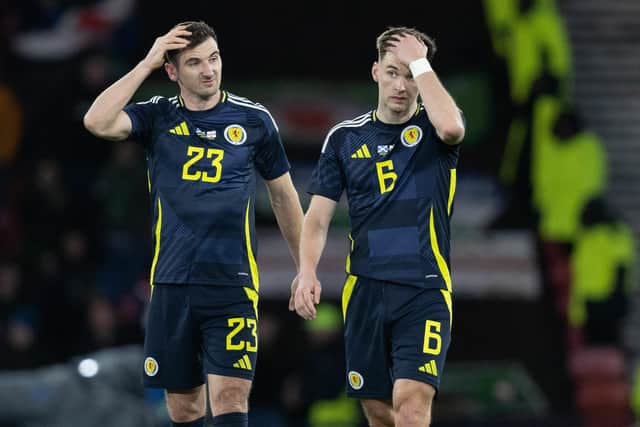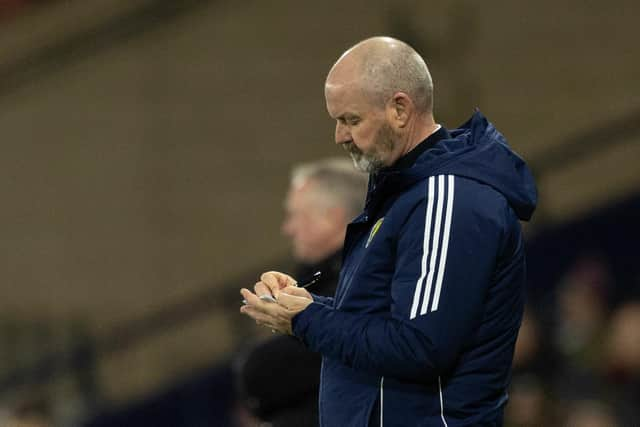Steve Clarke and Scotland left with more questions than answers as history repeats with Northern Ireland loss
The next time there’s a major finals in Germany on the horizon, here’s some advice for the SFA: best flick past the page containing Northern Ireland’s contact details.
“We were skipping along the road to Munich, singing ‘Dooby dooby doo’, and yelling ‘Easy’. We were high on euphoria and it was all becoming too smooth and too predictable and we had not noticed that we travelled on a via dolorosa. We know now.”
Advertisement
Hide AdAdvertisement
Hide AdSo wrote John Rafferty for this very newspaper nearly half a century ago after Scotland succumbed 1-0 at Hampden against Terry Neill’s re-emerging Northern Ireland side. The knives were out for Willie Ormond, the then Scotland manager. Even Denis Law's place was being questioned. The World Cup in Germany was only a month away.


At least Steve Clarke has a bit longer, around 78 days, to sort things out. Is he confident he can do that with just two matches left between now and the Euro 2024 opener against Germany in Munich on 14 June? “They are two friendlies...” he pointed out in the aftermath of Tuesday’s 1-0 loss to Michael O’Neill’s Northern Ireland, the country's first win at Hampden since 1974. “I wish there were nae more games!”
It’s certainly true that Scotland and friendlies are uneasy bedfellows and have been for a long time. The record is poor, just two wins from the last 19. “Not just mine,” noted Clarke. “Everybody’s friendly record. It is not very good.”
Of course, one crucial difference to 50 years ago, when Rafferty wrote the above words, is that the “jolt” against Northern Ireland, as the celebrated sports writer described the one-goal defeat, cannot be dismissed as solely that in the current scenario.
Rather, it is further evidence of a worrying downward spiral that’s been apparent since qualification was secured on a night when Clarke's team did not even play.


The truth is Scotland have not had anything to celebrate when they have been in action since a win against Cyprus in Larnaca in September. Even Berti Vogts did not suffer as long a sequence – seven matches – without a victory.
The late Craig Brown was in charge when Scotland last endured such a drought, which extended eventually to nine games and, like now, partly spanned a period when the team were preparing for a major finals. So yes, these things can happen when a manager is seeking to employ some new ideas. But worryingly, Clarke seemed slightly spooked on Tuesday. The change from a back three to a back four was forced because of an injury to Andy Robertson. Might he have done this before half time had it been otherwise? Too little experimentation has been a charge levelled at him although all outfield players bar Celtic left-back Greg Taylor got minutes against the Netherlands and Northern Ireland.
Indeed, what exactly has Clarke figured out in this latest international window, which of course involves more than just the two games? Training sessions will have been invaluable opportunities to assess his alternative goalkeeper options for example. Indeed, it turns out these sessions were the only times he chose to do so.
Advertisement
Hide AdAdvertisement
Hide AdPerhaps surprisingly, Clarke stuck with Angus Gunn in both matches rather than give even a half to Craig Gordon, whose lack of action must be a concern as he seeks to break back into the Hearts side on a regular basis. Sending him on for the second half against Northern Ireland would have been fairly pointless in any case, with the hosts piling on pressure and the visitors seemingly content to defend what they had.
Scotland failed the test when it came to finding space in a cramped half, which is maybe not as worrying as it might otherwise have been. Such expertise won't be required in Germany, where the host country, Hungary and Switzerland, Scotland's Group A opponents, will be intent on making the running.
All three teams’ fortunes are currently contrasting markedly with Scotland, who were probably already group underdogs. Germany have just beaten France and the Netherlands while Hungary are unbeaten in their last 14 outings. Switzerland, meanwhile, have suffered just one defeat in their last 12 matches and beat Republic of Ireland 1-0 in Dublin on Tuesday night. They are all motoring nicely towards tournament football.
Clarke, meanwhile, is left with more questions than answers. He spoke about having as many as nine of his first XI for Euro 2024 already in his head prior to the game against Northern Ireland, although he conceded a couple of these could change and might well have done so following such a significant setback as Tuesday. How many likely starters against Germany were in the side at Hampden? Seven, eight perhaps? Enough to prompt concern that, well, if they can’t beat (an admittedly impressive) Northern Ireland…
Grant Hanley and Callum McGregor – who has been missed – should return in time for the finals, while the need for Aaron Hickey, currently recovering from hamstring surgery, to get back up to speed has become considerably more urgent. Nathan Patterson cannot be expected to play so rarely for Everton and then pick up the pace of international football.
Clarke dismissed the notion that the group will have started to feel down about themselves when there should be such excitement. “All I said to them was go away and play well for your club, win trophies if you are going for trophies and don’t get relegated if you are fighting a relegation battle,” he said, having been asked for his message to players before they left the camp. “Just do what you have to do and make sure you are fit when I pick the squad in May, and that’s it really.”
It will soon be it. Scotland are reaching the point where fans are simply hoping everything will be alright on the night in Munich as well as, perhaps more relevantly, Cologne and Stuttgart, where Clarke's side play likely second place rivals Switzerland and Hungary respectively.
Scotland responded to the home defeat to Northern Ireland in May 1974 by beating England and Wales in Home International Championship fixtures before emerging unbeaten from a group containing Brazil in Germany.
Advertisement
Hide AdAdvertisement
Hide AdWhile we all know how that worked out, avoiding defeat in all three upcoming Group A assignments is an outcome most would take, although only if one involved the win that has become so elusive of late.
Comments
Want to join the conversation? Please or to comment on this article.